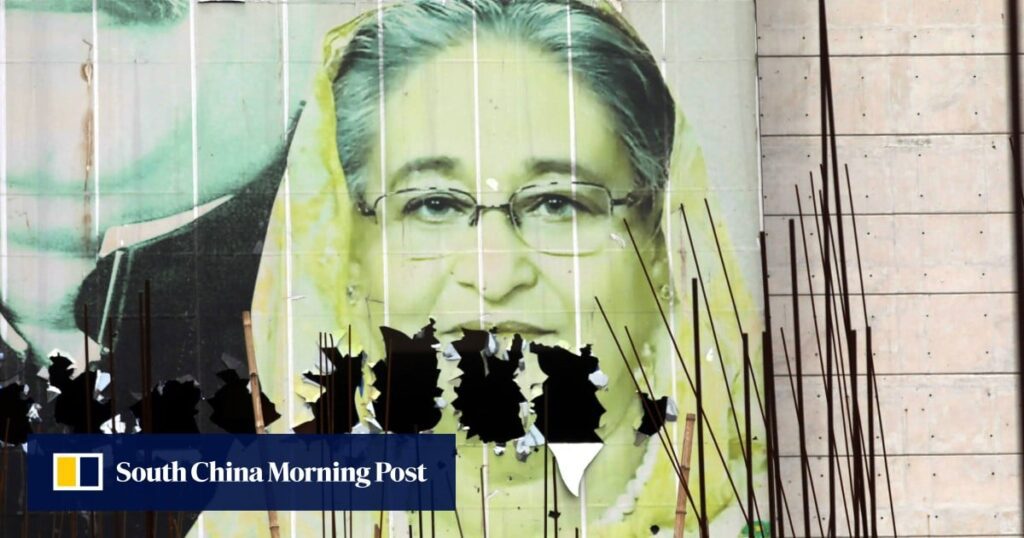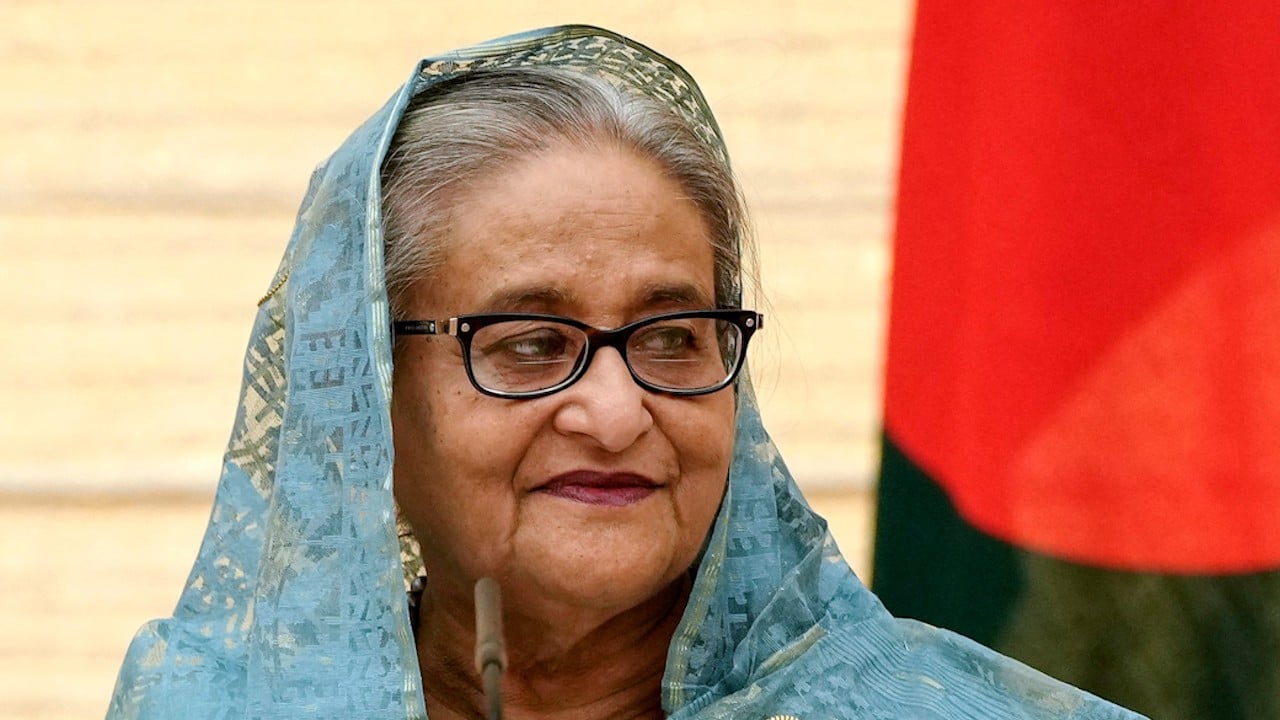Following Hasina’s departure, the Chinese foreign ministry said Beijing was following closely developments in Bangladesh. “As a friendly neighbour and comprehensive strategic cooperative partner of Bangladesh, China sincerely hopes that social stability will be restored soon in the country,” it added.
Ali Riaz, a political scientist at Illinois State University, told This Week in Asia that he did not foresee any immediate impact on China’s investments in Bangladesh.
Hasina’s downfall was precipitated by weeks of anti-government student protests and violence sparked by anger over job quotas allocated to the offspring of those who fought in the country’s 1971 war of independence.
Of the more than 300 people who died in the protests, many of them were unarmed and gunned down by state forces.


As Hasina fled, protesters stormed her residence, emerging later with a jumble of keepsakes to mark the ousting of South Asia’s longest-serving leader, ranging from paintings and statues to flatscreen TVs.
Even Awami League party loyalists were caught off guard by the seismic event, according to human rights advocate and academic Mubashar Hasan.
“They were dumbfounded by how quickly she fled. They felt betrayed by her. It was she who put them against the students,” he said.
Trade with China and mega projects
Bangladesh’s protesters are seeking new political arrangements that place leadership accountability, sustainable economic growth and social equality as the country’s core goals, with student leaders, army officers and opposition politicians set to play key roles. It is unclear if the remnants of the former ruling Awami League would have a part in the new Bangladesh with its deposed figurehead ensconced in India.
For now, Nobel Peace Prize laureate and micro-financing pioneer Muhammad Yunus is looked upon by millions of Bangladeshis as their brightest hope to steer their country towards short-term stability under an interim government. One of the interim leader’s biggest tasks is holding free and fair elections, a crucial marker of the country’s recovery from the Hasina years given that the former prime minister was alleged to have rigged the last three general elections.
Analysts say Bangladesh’s new leaders would also have to look at ways to reduce the lopsided trade balance in favour of China.
China is Bangladesh’s largest trading partner, with bilateral trade totalling 168.4 billion yuan (US$23.6 billion) in 2023, including 161.1 billion yuan of Chinese exports to Bangladesh. Consequently, Bangladesh’s foreign currency reserves face huge pressure due to the trade deficit with China and this in turn has a trickle-down adverse impact on the lives of ordinary Bangladeshis.


Similarly, the leaders will have to relook at the projects built in Bangladesh under the Belt and Road Initiative. Bangladesh joined the Belt and Road Initiative in 2016, drawn by Chinese loans for big-ticket infrastructure projects it could not afford to pay on its own including roads and railways, power lines and communications grids, seaports and South Asia’s first underwater transport tunnel.
As a result of Bangladesh being the first country in South Asia to join the Belt and Road Initiative, Dhaka was rewarded with a visit by President Xi in 2016. Billions of dollars of project-financing loans to Bangladesh followed, helping to burnish Hasina’s economic credentials.
Speaking at the launch of “The Belt and Road Initiative in Bangladesh” report last September, Chinese ambassador to Bangladesh Yao Wen said China has built “12 roads, 21 bridges and 27 power and energy projects” in Bangladesh while Chinese companies have created more than 550 thousand jobs in the country.
Endemic corruption
But with Bangladesh embarking on mega projects, the scourge of corruption surfaced under Hasina’s watch.
In 2012, the World Bank pulled financing on the Padma Bridge to link Dhaka to the southern part of the country after it became mired in allegations of massive corruption, which critics said was typical of the major projects under the Hasina era as she sought to shore up her Awami League party. A Chinese state-owned company involved in the bridge project later built a side road and other facilities.
Last year, Bangladesh opened the China-backed Karnaphuli Tunnel, a 3.2 km road link under the Karnaphuli River in the port city of Chittagong built by the China Communications Construction Company, with half of the US$1.1 billion price tag picked up by Export-Import (Exim) Bank of China.
The tunnel, however, raised questions over the necessity of a project in an impoverished coastal area. Its backers said the project would spur growth, jobs and trade flows between Bangladesh’s export zones and an exclusive Chinese economic zone in nearby Anwara.


But critics say construction of the tunnel, like many mega-projects in heartlands led by Awami League officials, was tainted by corruption as budgets ballooned and kickbacks linked to Hasina’s countrywide patronage network were given out.
“These mega-projects were intended to first be a demonstration of development … even if Bangladesh does not exactly need it,” Riaz said. “For every 100 dollars you spend you can steal 10 dollars. Someone is going to get that money and that someone is evidently going to be close to the regime.”
China’s strategic partner
Despite the myriad of challenges faced by Bangladesh, China was expected to stand by its South Asian partner, said Rayhan Islam, a protester who took part in the demonstrations that led to Hasina’s ouster.
China has supported Hasina not because it favoured her but because she was Bangladesh’s leader for a long time, said Islam, who studied medicine in the Chinese province of Sichuan.
Beijing’s approach to diplomacy was not conditional on fulfilling standards of human rights and democracy and this applied to Bangladesh too, he added.
“They prioritise business and stability so the specifics of how Hasina clung on to power didn’t concern them much.”
Ultimately, Bangladesh needed the support of China while Beijing wanted to expand its regional influence so both countries would find ways to work together, Islam said.
“It’s not just about individual leaders like Hasina, it’s about the bigger picture of geopolitics. Leaders come and go but national and international policies last,” he told This Week in Asia.
Riaz said there were concerns among Bangladeshis as to why China had stood by Hasina’s regime and whether Beijing could be relied upon going forward.
Nonetheless, China is likely to continue supporting Bangladesh’s long-term growth and investing in the country given its importance as Beijing’s strategic partner in South Asia, according to Riaz.
“In terms of the relationship, as long as China remains cautious and takes a step back until the dust settles, I do not see an immediate problem,” he said.
Chinese businesses are worried about the billions of dollars invested in Bangladesh and the risks of a potentially severe downturn in its economy amid the volatile political situation in Dhaka, analysts say.
S&P Global Ratings has flagged the risk of Bangladesh’s growth outlook worsening as a result of the country’s political crisis. “The damage to credit metrics may be contained if the sociopolitical situation normalises soon,” it added.
Economic silver lining
While Hasina’s economic track record is expected to come under scrutiny by the interim government, the country’s next leaders would likely take note of the positives under her rule.
Although Bangladesh remains one of Asia’s poorest nations, tens of millions of its people were lifted out of poverty during Hasina’s tenure.


Fuelling its economic growth was the crucial garment industry, which provided jobs to millions of Bangladeshis. With a contribution of around US$40 billion a year to export earnings, the apparel made by Bangladeshi workers was bought by global fashion brands such as H&M, Zara, Target and Uniqlo.
Persistently low pay in the country, however, drove millions of Bangladeshis to seek jobs overseas, ranging from cleaning the windows of skyscrapers in the United Arab Emirates to working at palm oil plantations in Malaysia.
Hasina’s son Sajeed Wazed, a businessman and a member of the Awami League, has slammed the protest movement for deposing his mother and ignoring her numerous contributions to the country’s economy.
In an interview with Indian-based digital channel WION, Wazed said the period of Hasina’s rule was the “golden age” and that “it’s all downhill” for Bangladesh after her downfall.
“People have made their choice and they will get the leadership they deserve … They’re very ungrateful. After all she has done, after all the development Bangladesh will now become the next Pakistan,” he said.
Human rights violations
Ultimately, Hasina’s critics see her legacy as being defined by the country’s poor human rights record and endemic corruption, analysts say.
The tainted elections in January, which Hasina won, were followed by a wave of arrests of opposition politicians and fatalities sparked by clashes involving security personnel and protesters.


Around 3,000 people were killed extrajudicially and more than 700 became victims of enforced disappearances during Hasina’s rule, according to Bangladeshi human rights group Odhikar.
Despite overwhelming evidence of enforced disappearances, the Awami League has ignored calls to “address the culture of impunity”, Human Rights Watch said in a 2021 report.
The political repression, widespread anger over the job quota scheme, the stacking of once independent state posts with party loyalists and rampant corruption within Hasina’s clique coalesced to trigger the series of events that led to her fall from power.
“They were out of touch, disconnected. This was a crisis of their own making because they entered into so much propaganda, they became detached from reality,” Hasan said.
Human rights advocates and protesters say the new government will have to address the years of injustice and prosecute Hasina’s allies who have grown rich illegally under her rule.
“We want a government that is not corrupt, we want our leaders to be transparent and to listen to us,” Fahim Hossain, a 22-year-old Rajshahi University student, told This Week in Asia.
“This should send a clear message to whoever comes next: if they do not act in the interest of the people, we won’t just sit here doing nothing.”


